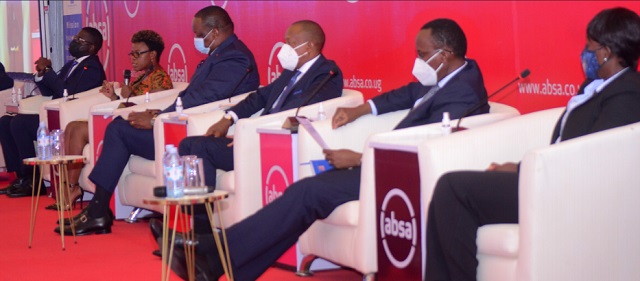
Manufacturers, experts want government to put in place protective measures
| THE INDEPENDENT | How can Uganda take advantage of regional markets to boost economic activities? How best can the private sector work with government to tap into business opportunities in the East African region and beyond?
These are pertinent questions that players in the EAC economy circles keep attempting in an effort to influence policy directions that are critical in transforming peoples’ lives and jumpstart the economy that is currently battling COVID-19 hit.
At a recent post-budget forum, organized by Absa Bank Uganda, experts including Daniel Birungi, the executive director for Uganda Manufacturers Association, said, Uganda needs an export guarantee scheme for trade with Democratic Republic of Congo and South Sudan given that the two countries have experienced political instability that has cost traders billions of shillings.
He said: “We have opened up South Sudan and DRC, which is very good work. But the aspect of volatility in these markets requires that we have an export guarantee scheme… so that, when a manufacturer transports their goods to these countries and loses them, they are able to have recourse.”
An export credit guarantee provides safeguards and insurance for exports by a government or semi-government agency to ensure that an exporter receives payment for goods shipped overseas in the event the customer defaults.
“At present, it is really a wild west out there,” Birungi said, “you go at your own risk and whatever happens, is your business or you come back to the government and request a bailout, which is not the right way.”
On June 16, President Yoweri Museveni and his DRC counterpart Felix Tshisekedi commissioned the start of the construction work of roads in the Democratic Republic of Congo-DRC. They also launched the Mpondwe Bridge in Kasese district.
The two leaders met at the Kisindi border post to launch the projects that will be jointly financed by the two countries. The government of Uganda, through the Minister for Works and Transport is injecting up to Shs243billion into the construction of the roads measuring 223km.
During the reading of the FY2021/22 national budget, Amos Lugoloobi, the state minister for Finance announced that Shs5.1trillion has been allocated in the budget for the development of the integrated transport infrastructure and related services, which includes a 1,182 km road connecting Uganda and the DRC.
Additionally, the budget also makes provisions to rehabilitate the Tororo-Gulu Meter Gauge Railway (MGR) and complete the Gulu Logistic Hub, both to expand trade with South Sudan.
Available government data indicates that in 2018, Uganda exported goods to DR Congo worth $532million, including an estimated $312million in informal exports, while the country’s exports to South Sudan amounted to $357.34million during 2020.
Ugandan manufacturers have been searching for new markets in DR Congo and South Sudan following challenges accessing markets for goods in Rwanda and Kenya.
Relations between Uganda and Rwanda have not been good for the last two years since the latter closed its borders over political reasons. Kenya on the other hand has on several occasions blocked entry of Uganda’s goods including dairy, sugar, maize, chicken and more citing standards issues, but Ugandan traders have dismissed those reasons, saying Kenya is merely protecting its traders from regional competition.
That aside, Mumba Kalifungwa, the Absa Bank Uganda’s managing director supports efforts to develop infrastructure that will stimulate growth in new markets or enhance the already existing ones.
He said, the stewards on the nation are trying to facilitate growth in trade by creating enabling activities that are targeted towards areas that are going to improve on connectivity.
“The implication of that is that there is a targeted and calculated agenda to support growth in terms of productivity,” he said.
Kenneth Mugambe, the director of budget at the Ministry of Finance Planning and Economic Development said, access to markets relates to the provision of infrastructure and standards, because the region provides one of the biggest markets.
“So, we are going to take advantage of that to ensure that we enhance access to these markets for Ugandan products,” Mugambe said.
****
 The Independent Uganda: You get the Truth we Pay the Price
The Independent Uganda: You get the Truth we Pay the Price





